Grave Of Opposition Martyr Mahsa Amini Vandalized
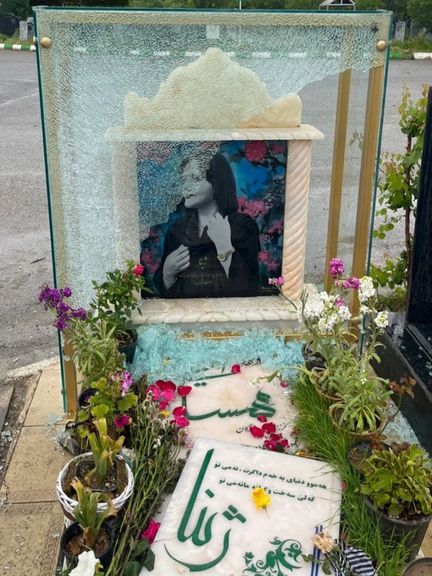
A glass pane at Mahsa Amini’s tomb has been broken in an affront to the memory of the Iranian woman who died in police custody.

A glass pane at Mahsa Amini’s tomb has been broken in an affront to the memory of the Iranian woman who died in police custody.
Her brother Askan Amini published a photo showing the damage in front of her grave stone.
Posting on Instagram, he wrote: "The glass of your tombstone also bothers them. Break it a thousand times, we will fix it again, let's see who gets tired."
Mahsa Amini was 22 years old when she died in the custody of the morality police in September last year after her arrest for “improper hijab”.
She had come from Saqqez to Tehran with her family to visit her relatives before she was taken in by the authorities on September 13.
After receiving serious head injuries during the first two hours of her detention she was taken to a hospital in Tehran, but on September 16, it was announced that the doctors' efforts to save her had failed.
Her death sparked widespread mass protests against clerical rule that have continued for months, posing the most serious challenge to the Islamic Republic since its birth.
The graves of those who died while opposing the regime have often been a source of contention with the authorities.
Earlier this year, the Islamic Republic stopped the installation of a stone on the grave of Mohsen Shekhari, a protester who was sentenced to death and hanged in December. A tombstone was put up by anonymous dissidents but was later destroyed by the authorities.

The execution of three political prisoners in Iran has sparked a resurgence of nationwide street protests.
The Tehran neighborhoods of Tehransar, ShahrakEkbatan, Sattarkhan and Aryashahr were rocked by demonstrations Saturday evening that continued until the early hours of Sunday.
Anti-regime slogans were heard elsewhere in areas across the capital.
There were reports of sporadic clashes with security forces attempting to disperse the protesters, who in some neighborhoods had managed to block the roads after setting fire to trash cans.
In the religious city of Mashhad, protesters chanted "The Islamic regime is the killer of Iranians." Demonstrations were reported in several other cities, including Abdanan in the western province of Ilam and Gorgan in the northern province of Golestan.
While security forces came out in large numbers to stop demonstrations being held, defiant Iranians staged protest roadblocks in the streets of their cities and voiced their anger by hooting their horns.
The unrest follows the hanging of demonstrators Majid Kazemi, Saeed Yaghoubi and Saleh Mirhashemi on Friday. Protests outside the jail where they were held and outraged calls by the international community had failed to halt the Islamic Republic's execution machine. The deaths brought to at least seven the number of protesters hanged since nationwide protests broke out in September 2022 following the death in custody of 22-year-old Mahsa Amini.
The three were convicted over the death of two IRGC’s Basij militia members and a police officer during protests in November last year, in what Persian media have dubbed the ‘Esfahan (Isfahan) House’ case, named after the area, where they were arrested. Human rights campaigners say they were tortured into confessions, and there was no reliable evidence against them.
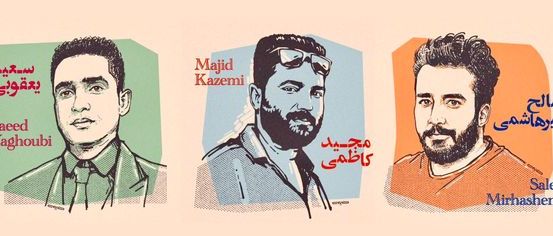
Leaked audio from police radio chatter from the night the three regime agents were killed indicates that they were killed by friendly fire of plainclothes forces. The victims had alibis for the time the agents were killed, with the family of one of the victims saying there is CCTV video footage of their son at work.
About a day after the executions, regime agents also attacked the protesting family of Majid Kazemi and arrested two of his brothers and his sister.
Iranians abroad have held protests against the Islamic Republic execution spree in dozens of cities around the world since Saturday.
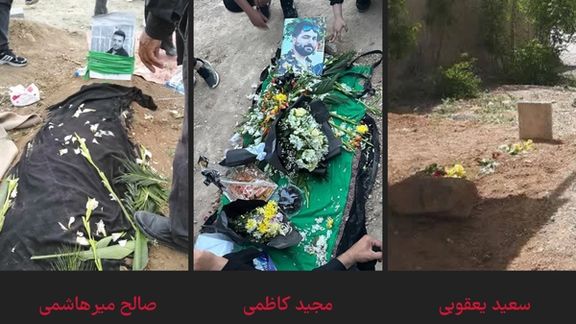
Nationwide protests that erupted after the death of Kurdish Iranian Mahsa Amini posed the biggest internal challenge to the Islamic Republic since its establishment in 1979.
So far, around 500 civilians have been killed by security forces and at least 20,000 arrested. While many have been released, around 1,500 face criminal charges, and at least 80 detainees face the death sentence.
Opposition activists say the regime is using the death penalty as an intimidation tactic to stop further protests.
The United Nations said earlier in the month that Iran has executed 209 people so far this year, calling the record "abominable".
Earlier in May, Amnesty International urged Iran to drop the execution of the three as well as that of six ethnic Arab men who gave “tortured-tainted” confessions.
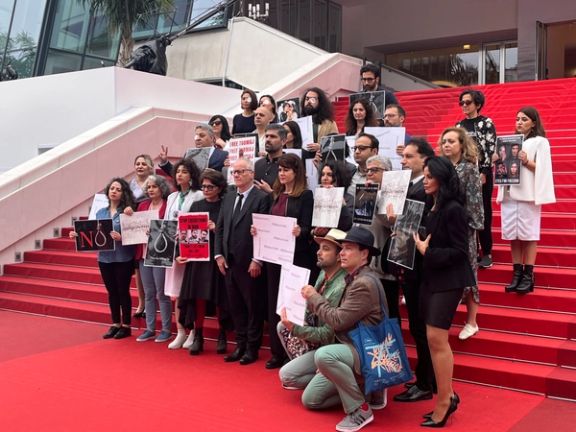
Iranian artists at the Cannes Film Festival have held a protest over the Islamic Republic’s execution spree.
On the fifth day of the festival, Iranian filmmakers displayed images of three protestors who were recently hanged in Esfahan (Isfahan).
Majid Kazemi, Saeed Yaghoubi and Saleh Mirhashemi were executed on Friday over the death of two IRGC’s Basij militia members and a police officer in protests of November last year, in what Persian media have dubbed the ‘Esfahan (Isfahan) House’ case.
The participants kept silent for a minute to pay respect to the hanged protesters.
Zar Amirabrahimi, a well-known actor, Kaveh Farnam, a producer, Sepideh Farsi and Milad Alami, directors, Asal Bagheri, a researcher, and Sahar Bagheri, one of the managers of the French department of Amazon Company, took part.
They talked about the current conditions of Iranian cinema, censorship, the impact of recent protests on Iranian filmmakers, and the conditions of filmmakers outside Iran to express the untold narratives of Iran in their works.
Referring to the current situation in Iran, the cinematographers also discussed the difficulties of making films in accordance with the current reality in Iran and passing through censorship. They called for the support of the cinema world and events such as the Cannes Festival to consider the plight of Iranian filmmakers.
The 76th Cannes Film Festival began on May 16 and will end on May 27.
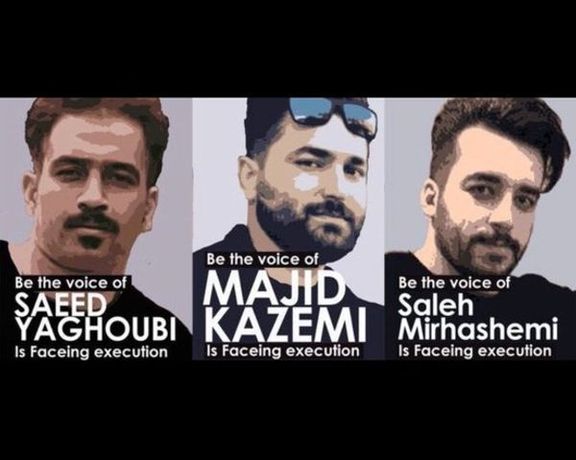
Iranian regime agents have attacked the family of a recently executed protestor in their home.
Security personnel assaulted the brothers and parents of Majid Kazemi, and carried out two arrests.
A cousin, Mohammad Hashed said in a tweet Sunday that the agents arrested two brothers of Majid while they were severely injured.
Hashemi said: After a few hours, while Majid's sister was following up on their status, they returned and arrested his sister too.”
Majid Kazemi, Saeed Yaghoubi and Saleh Mirhashemi were convicted over the death of two IRGC’s Basij militia members and a police officer in protests of November last year, in what Persian media have dubbed the ‘Esfahan (Isfahan) House’ case.
The judiciary announced their execution in a statement on Twitter Friday morning, bringing to at least seven the number of protesters hanged since nationwide protests broke out in September 2022 following the death in custody of 22-year-old Mahsa Amini.
The three were handed down the death sentence in a trial condemned as a travesty of justice by human rights campaigners, who say the prisoners were tortured into confessions, and there is no reliable evidence against them.
Over the past few days, a large number of foreign officials and human rights activists had called on the Islamic Republic to stop the executions.
So far, around 500 civilians have been killed by security forces and at least 20,000 arrested. While many have been released, around 1,500 face criminal charges, and at least 80 detainees face the death sentence.
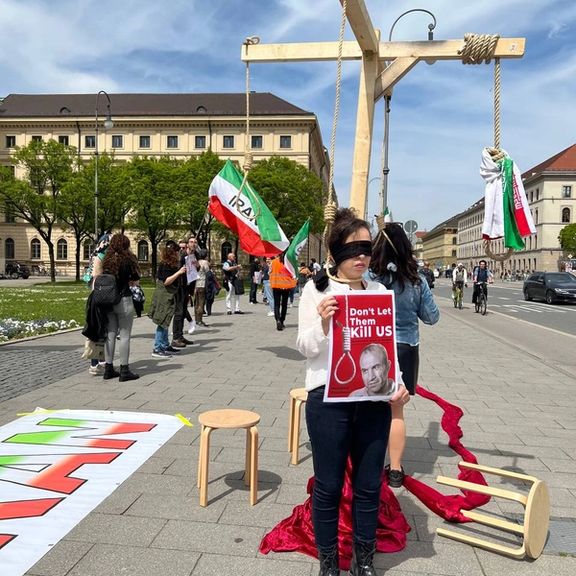
Iranians at home and abroad staged protests Saturday against the Islamic Republic execution spree, the latest victims of which were three people hanged Friday.
The gathering of protesters started in Australia and New Zealand and continued until Saturday evening in dozens of other cities in Sweden, Denmark, Germany, Norway, Finland, Holland, Austria, among many others. Cities in the western parts of the US and Canada were the last where people held rallies.
Iranians are outraged and frustrated over the hangings; frustrated that protest gatherings outside the prison where they were held failed to halt the executions and outraged that calls by the international community did not stop the Islamic Republic's execution machine.
During rallies in Norway, Masud Gharahkhani, the Iranian born politician who heads the Norwegian parliament, sent a video message to protesters in the Swedish city of Gothenburg, saying, "In Iran, young people are imprisoned and executed, journalists do not have freedom and security, and the country's oil money is not spent for the people, but wasted on corruption.”
Alireza Akhondi, Swedish-Iranian member of the Swedish parliament, told Iran International during the rallies that the gathering of expatriates around the globe in the past few months prompted several resolutions in Western against the Islamic Republic.
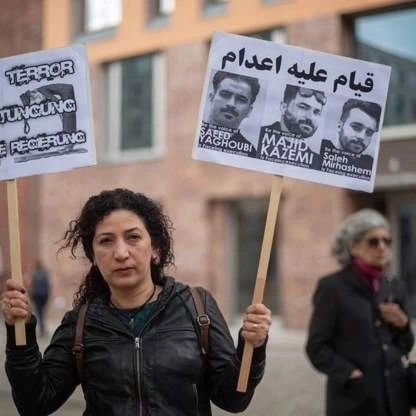
The rallies were planned before the regime hanged Majid Kazemi, Saeed Yaghoubi and Saleh Mirhashemi Friday morning over trumped up charges after extracting forced confessions, in a case described as a travesty of justice. Human rights campaigners say they were tortured into confessions, and there was no reliable evidence against them.
They were convicted over the death of two IRGC’s Basij militia members and a police officer during protests in November last year, in what Persian media have dubbed the ‘Esfahan (Isfahan) House’ case. The three had been arrested in an Esfahan (Isfahan) neighborhood called “Esfahan House,” thus the name of the case.
Leaked audio from police radio chatter from the night the three regime agents were killed indicates that they were killed by friendly fire of plainclothes forces. The victims had even alibis for the time the agents were killed, with the family of one of the victims saying there is CCTV video footage of their son at work.
In reaction to the “grossly unfair trial that bore no resemblance to meaningful judicial proceedings,” Diana Eltahawy, Amnesty International’s Deputy Director for the Middle East and North Africa, said on Saturday, “These executions are designed by the Iranian authorities to send a strong message to the world and the people of Iran that they will stop at nothing to crush and punish dissent. In the absence of a robust international response, the authorities will continue to revel, unabated, in their impunity with lethal consequences for people in Iran.”
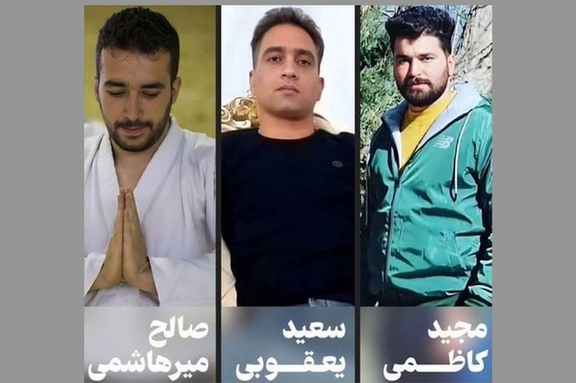
“Governments must urgently denounce these executions, in the strongest possible terms, through public statements and demarches. However, in the face of the Iranian authorities’ unrelenting use of the death penalty, this is not enough. People in Iran don’t have the luxury of time – they are being arbitrarily deprived of their lives at a horrific rate under the guise of judicial executions,” she said, urging all states “to exercise universal jurisdiction over all Iranian officials against whom there is sufficient admissible evidence of criminal responsibility for torture and other crimes under international law.”
Several neighborhoods in the capital Tehran and in Esfahan as well in a few other cities were scenes of protests against the regime’s executions. Students at universities across Iran also staged demonstrations.
Three more prisoners were executed for drug-related offences on Saturday as protesting families were shot at and tear-gassed outside the jail.
Friday's executions brought to at least seven the number of protesters hanged since the beginning of the nationwide protests last September, which turned into one of the boldest challenges to the clerical rulers since the 1979 revolution. The protests were ignited by Mahsa Amini's death in the custody of Iran's morality police.
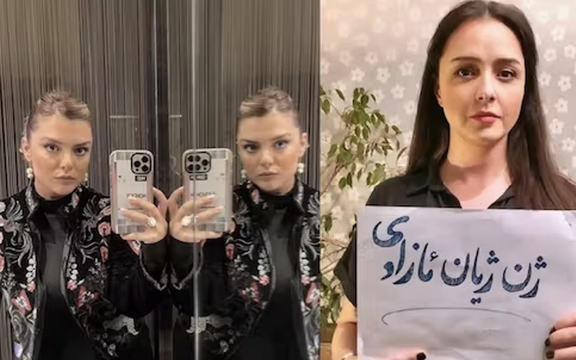
Actresses who remove hijab in Iran face a ban from performances of up to year under a new bill.
Measures already in place to punish female artists and athletes will be worsened by the legislation now going through parliament, news daily Entekhab reports.
A government spokesperson said the bill proposed by the Judiciary regarding hijab was reviewed and approved by the government and sent to the legislature last week.
The penalty will be a ban from all cultural activities for at least three months and up to a maximum of a year.
Even when anonymous, women found to have transgressed rules over the removal of veil, nudity and wearing thin clothes can now be identified through smart technology.
Those found guilty will initially be warned and fined up to three times, and in case of repeating the crime for the fourth time, they will be referred to the judicial authority.
If the hijab is removed in a car, after two warnings and a fine, the vehicle will be stopped for seven days. Civil servants working at state organizations will be prosecuted through the supervisory mechanisms up to three times, and the hijab remover finally will be referred to the judicial authorities.
Four decades after the Islamic Republic forced women to wear headscarves, long tunics and trousers, or the long black veil called chador, women are increasingly appearing in public in regular clothing such as colorful dresses and with no headscarf covering their hair.
A survey carried out by the ministry of Islamic guidance in 2015 showed that more than 70 percent of Iranians did not agree with compulsory hijab.